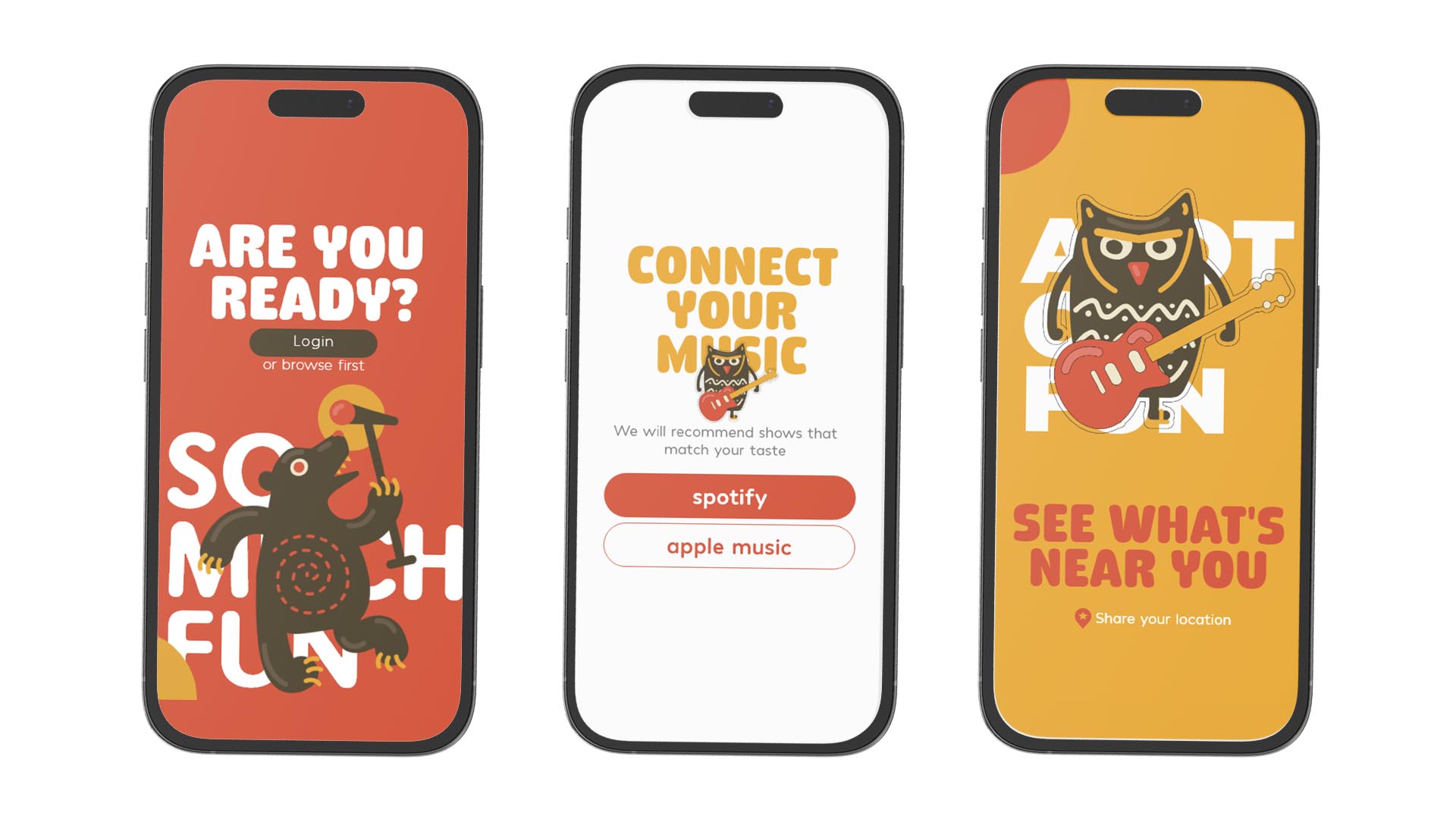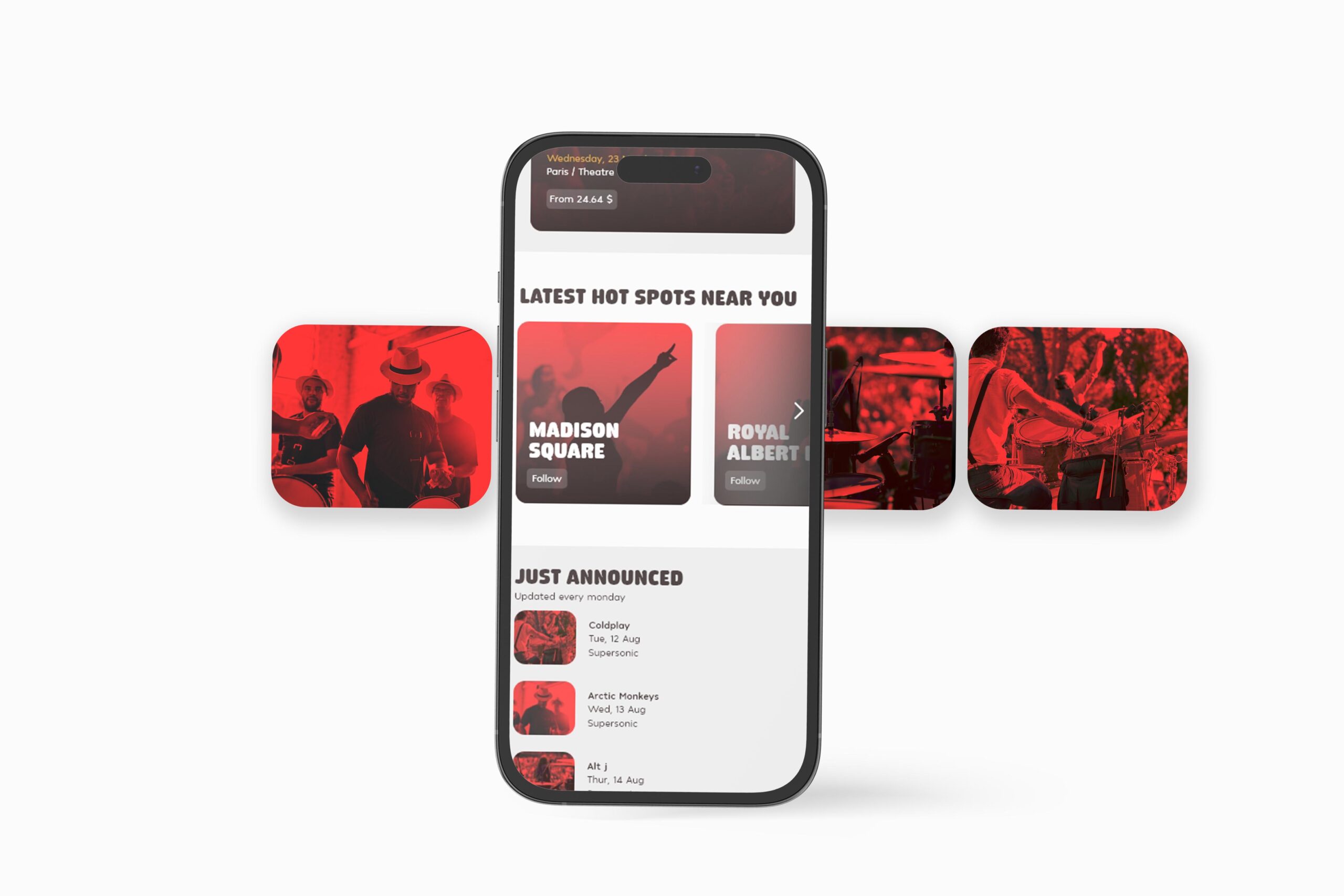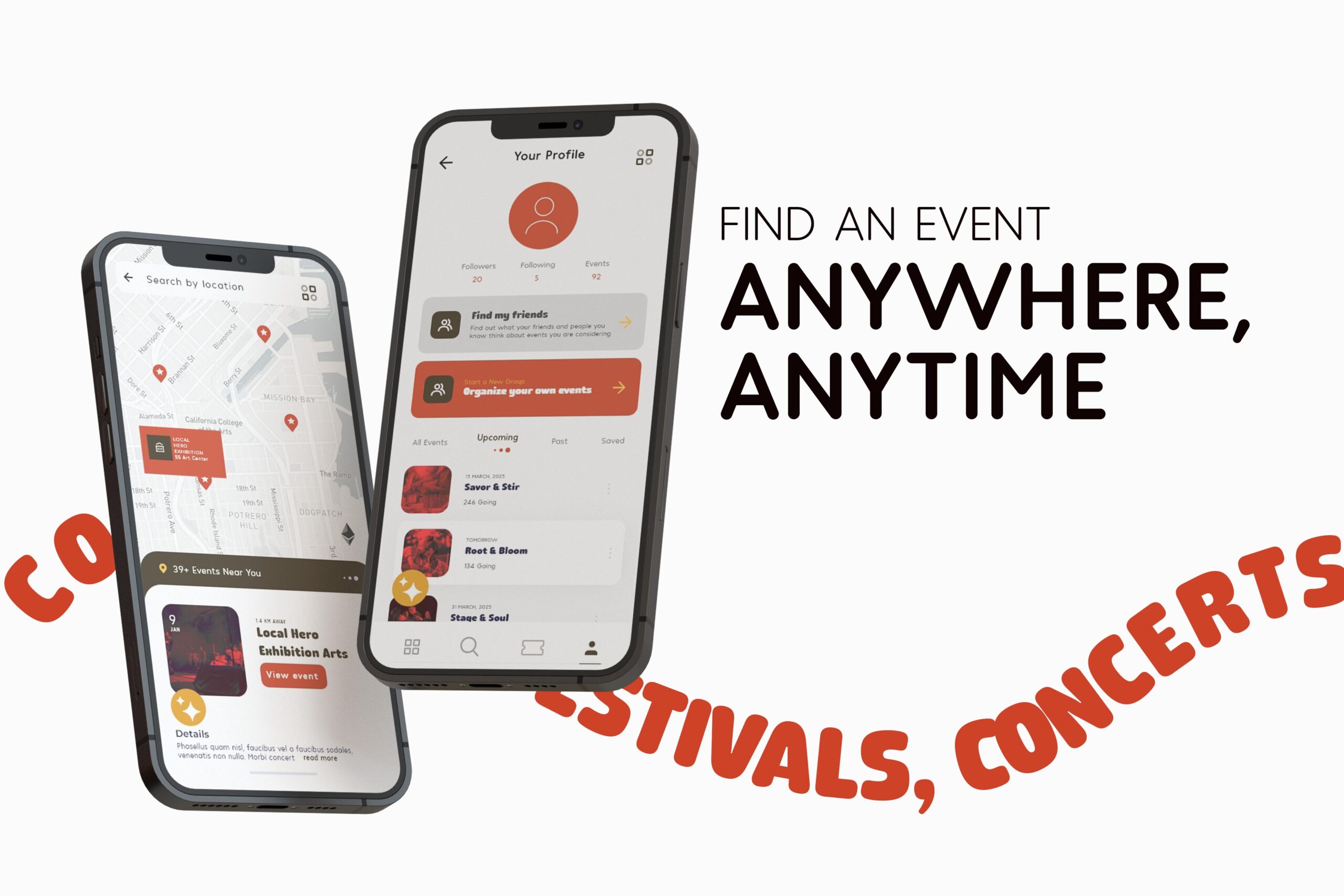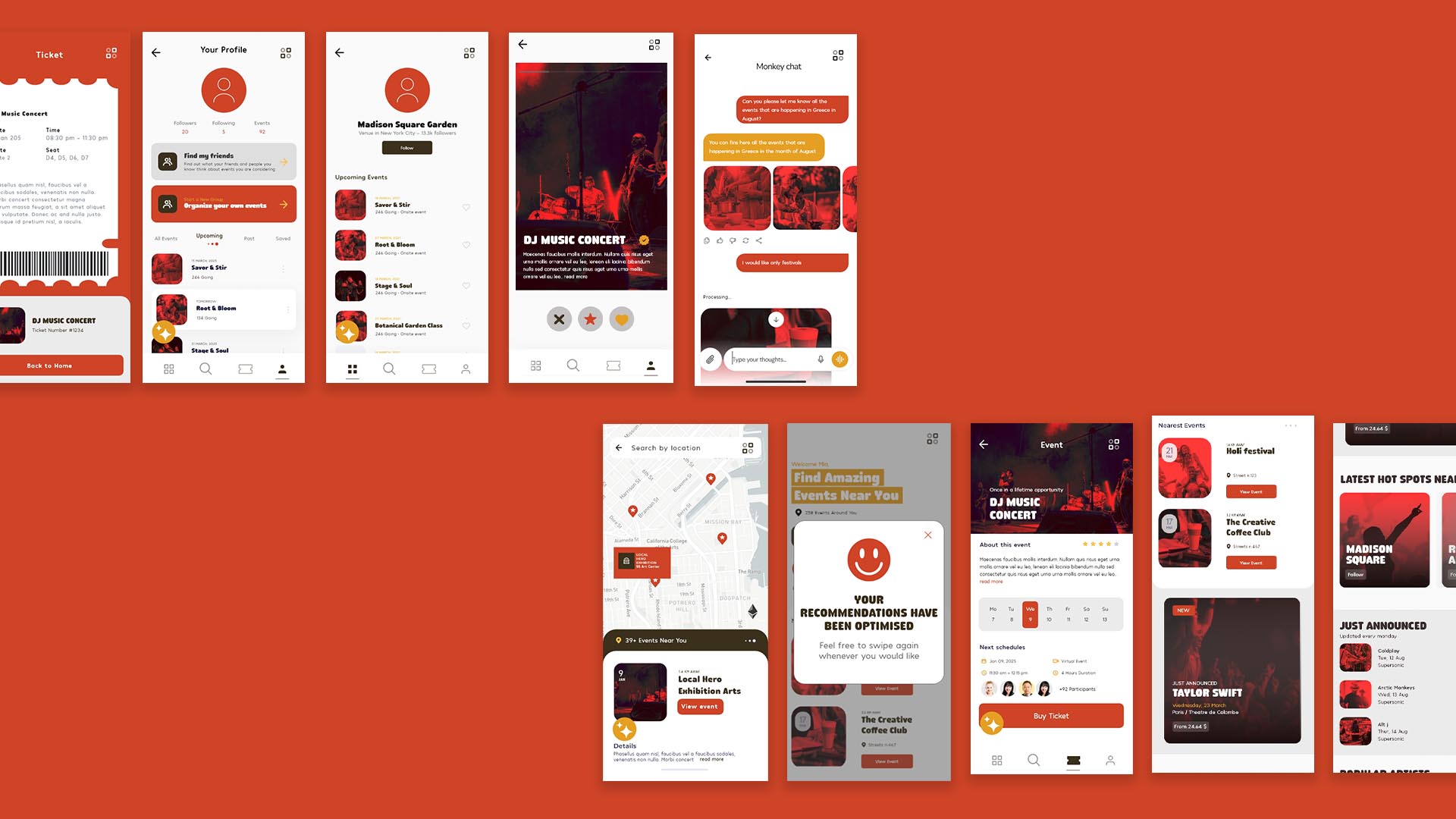An app that helps you keep up with all the events happening around you
— an overview
Party Animal is a smart, location-based mobile app that helps users discover events happening around them, anywhere, anytime.
From concerts and art exhibitions to pop-up markets, nightlife, and workshops, Party Animal curates a personalized feed of events tailored to each user’s tastes, habits, and location.
Powered by intelligent recommendation algorithms, the app learns what users enjoy and offers relevant, timely suggestions that feel custom-made. Additional feautures are added in order to make the process of finding out your taste, more fun and interactive. Whether you’re traveling to a new city or looking for something to do this weekend, Party Animal ensures you’ll never miss out on the events you like.
SECTOR
Artificial Intelligence / Personalization Tech, Entertainment & Leisure Industry
MY ROLE
Entire product design from research to conception, visualization and testing
TOOLS USED
Adobe XD, Adobe Photoshop and Microsoft Excel
The process is divided into six very important steps.

Gathering Insights

Clarifying the Problem

Generating Ideas

Designing Solutions

Validating with Users
User research
I interviewed 4 very social people who are always on the lookout for the next thing to do. In addition to learning about how they looked for events and concerts and festivals, I also asked about their experience in finding what they want, their frustrations, and what factors they take into account when looking for their next event. The following is a summary of their experiences:
Concern 1: Is this event actually happening? I could not find any proper link or details
They usually find out about the event through social media, on random reels. They tend to get frustrated because of unclear or unreliable event information, which leads to wasted time, confusion, or distrust in event listings. Instagram especially is overwhelming and not organized by date nor relevance.
This concern shows a need for accuracy, credibility, and convenience.
Concern 2: I just arrived to a new country / city , how do I find real local experiences, not tourist traps?
All the participants do some form of research before purchasing tickets. Some are more thorough than others and some enjoy the process while others don’t. Although when not researching a lot, they risk falling for tourist traps that are more costly and less interesting at the same time.
This shows a need for authentic, local, or curated content.
Concern 3: I don’t want to spend a lot just to go out.
When looking for tickets and events, they all liked having the ability to choose across different budgets and figure out what works best for them.
All of them suffer from guilt or regret after spending too much on an underwhelming event but at the same time have a fear of missing out on fun because of financial limits.
This highlights a need for affordable entertainment or, at the very least, assurance that the event offers good value for the cost.
How do people find out about events?
TikTok’s direct Eventbrite integration and partnerships with CTS Eventim reflect how 65% of Gen Z use social media for event discovery.
But when talking with people who look a lot for events and targets, they recommend checking out apps like Fever, Eventbrite and Facebook events (competitive analysis will be shown in a bit). Additionally, they’ve noticed that local coffee shops, bookstores, and record stores often have displays promoting upcoming shows and events. They suggest visiting these spots regularly and taking photos of the postings for future reference.
One participant also mentioned using culture magazines or independently run blogs that curate and list local events, which can be a helpful resource.
Competitive Analysis
To effectively position the app and uncover strategic opportunities, it’s crucial to analyze the strengths, weaknesses, and market approaches of key competitors such as Fever, Eventbrite, Facebook Events, and Time Out. This competitive analysis highlights where Party Animal stands, where it can differentiate, and how it can meet the evolving expectations of modern, mobile-first users.
I created an excel sheet and used a table to compare different elements of every app. This research focused mostly on direct competitors.

Clarifying the problem
Creating Personas
Understanding our users is the foundation of a user-centered experience.
Our personas were divided into two.
Our first persona, Mira, represents a typical user of our platform, a young, creative student who actively seeks out cultural experiences but faces challenges navigating the current event discovery landscape. By diving into her background, goals, and frustrations, we gain insight into how to design a solution that truly fits her lifestyle.
Persona One
BACKGROUND
Mira is a 23-year-old design student based in a Beirut. Surrounded by a dynamic and culturally rich environment, she thrives on discovering the city’s underground art scene, indie music shows, outdoor cinema nights, pop-up markets, and other off-the-beaten-path events. Her lifestyle is fueled by creativity, spontaneity, and a deep appreciation for local talent and culture.
Mira typically learns about events through Instagram stories, friend recommendations, or word of mouth—but the information is often scattered or shared last-minute. Despite her love for going out, she finds herself missing events she would’ve loved to attend or feeling overwhelmed by the time it takes to filter through irrelevant posts. As a full-time student with a limited budget, she’s also conscious of both cost and time.
DEMOGRAPHIC
Age
Gender
Location
Occupation
Income
Lifestyle
23
Female
Beirut
Design Student
Low to moderate
Creative, social, budget-conscious
Technology Use
Heavy mobile phone user (iPhone)
Uses Instagram, TikTok, Spotify
Occasionally uses Google Maps to look up venues
Uses WhatsApp groups for social planning
Rarely uses formal event apps; relies on stories, screenshots, and posts
Goals
Discover cool, niche events happening nearby
Have spontaneous, fun weekends without spending too much
Support local creatives and venues
Stay informed without having to scroll endlessly
Understanding our users is the foundation of a user-centered experience. This persona, Mira, represents a typical user of our platform, a young, creative student in Beirut who actively seeks out cultural experiences but faces challenges navigating the current event discovery landscape. By diving into her background, goals, and frustrations, we gain insight into how to design a solution that truly fits her lifestyle.

Persona Two
BACKGROUND
George is a 32-year-old product manager who works remotely for a global tech company. Originally from Dubai, he’s currently living in Barcelona but changes cities every couple of months as part of his digital nomad lifestyle. For George, traveling isn’t just about sightseeing—it’s about making genuine connections with people, blending into the local scene, and discovering authentic cultural experiences that go beyond the typical tourist itinerary.
With a busy work schedule and an organized mindset, George treats event planning the same way he approaches his job—efficiently and intentionally. He doesn’t like wasting time scrolling through irrelevant or generic listings. He prefers platforms that give him smart, curated recommendations based on his preferences, location, and schedule. His calendar is usually planned out a week in advance, balancing work responsibilities with networking dinners, local meetups, or a low-key live jazz night.
As a tech-savvy and experience-driven traveler, George has tried nearly every travel and events app available—Airbnb Experiences, Meetup, Nomad List, and Eventbrite—but still finds himself toggling between too many tabs just to plan one evening out.
DEMOGRAPHIC
Age
Gender
Location
Occupation
Income
Lifestyle
32
Male
Barcelona
Product Manager
Moderate to High
Tech-savy, outgoing
Technology Use
Uses multiple travel and planning apps
Has profiles on Eventbrite, Couchsurfing, and Nomad List
Relies on mobile push notifications and email summaries
Comfortable testing new tech products and beta versions
Goals
Find events that align with his interests when visiting new cities
Avoid tourist traps and feel like a local
Efficiently plan his week around social and professional activities
Discover social spaces where he can make real connections
User journey – Persona 2
Omar lands in a new city, ready to balance work with meaningful local experiences. With limited time and too many platforms to sift through, he seeks a smarter way to plan his week. His journey begins with curiosity and structure—leading him to a platform that promises relevance, authenticity, and a sense of belonging in unfamiliar places.

Generating Ideas
Brainstorm and ideate potential solutions.
Understanding our users is the foundation of a user-centered experience. This persona, Leila, represents a typical user of our platform—a young, creative student in Beirut who actively seeks out cultural experiences but faces challenges navigating the current event discovery landscape. By diving into her background, goals, and frustrations, we gain insight into how to design a solution that truly fits her lifestyle.
Opportunities and challenges
Growing event culture and FOMO trends
Users are increasingly looking for unique and timely local experiences. This idea encourages the basis of our product and showcases that it is in demand.
Opportunity #1
Tourism recovery and global mobility
As travel resumes post-pandemic, travelers seek local recommendations in real time. Following this idea we have created a live local map that showcases all the events near you.
Opportunity #2
Social sharing integration
As travel resumes post-pandemic, travelers seek local recommendations in real time. Therefore you can invite your friends to our application and see what they are up to.
Opportunity #3
AI & machine learning evolution
Can further improve personalization and prediction accuracy with tech advancements. We have our own chatbot to help in case of problems and confusion but also, the algorithm is always updated. We have also added features that would help our AI to give you the best recommendations and that is: ” Swipe Feature” in action.
Opportunity #4
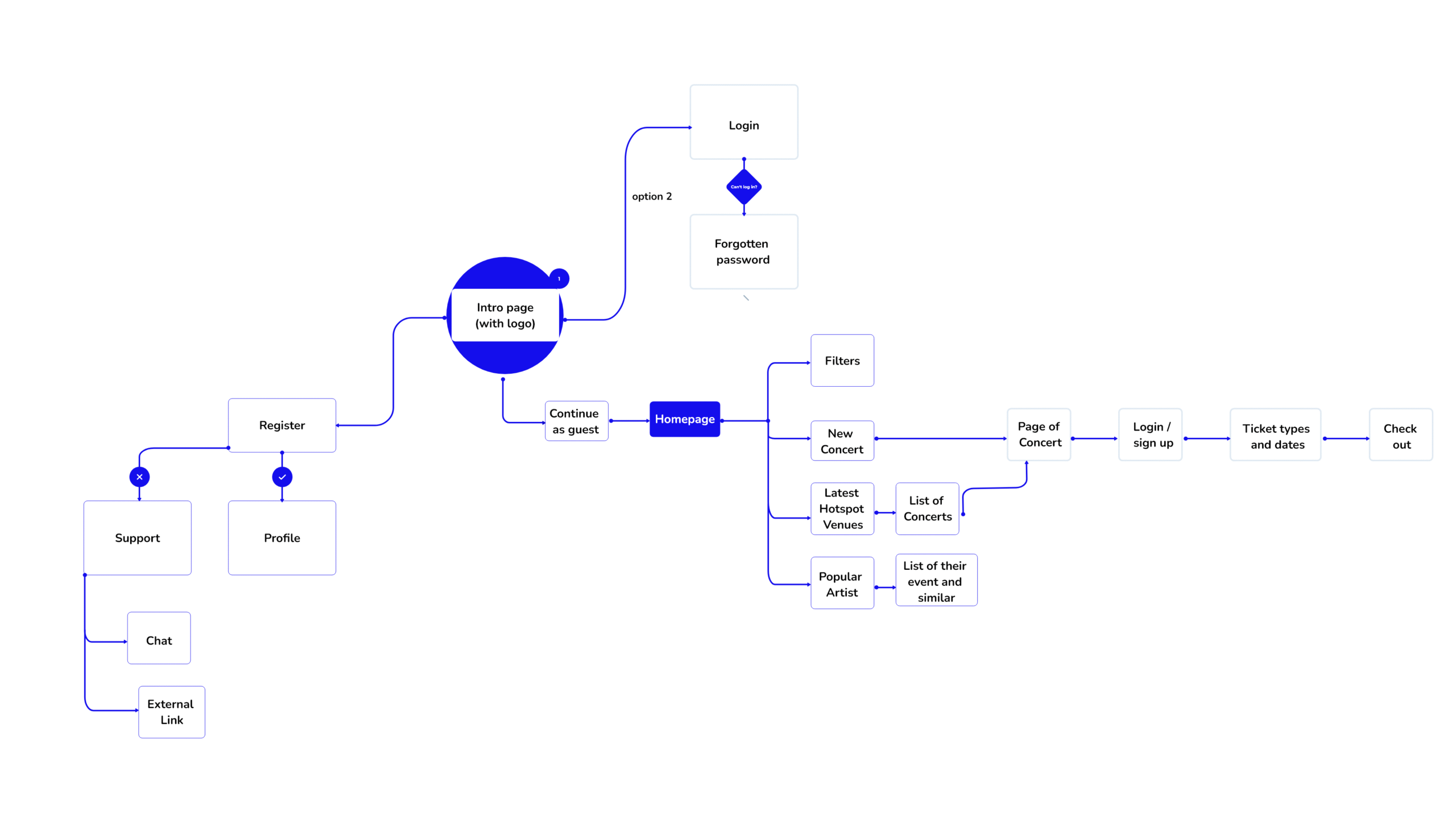
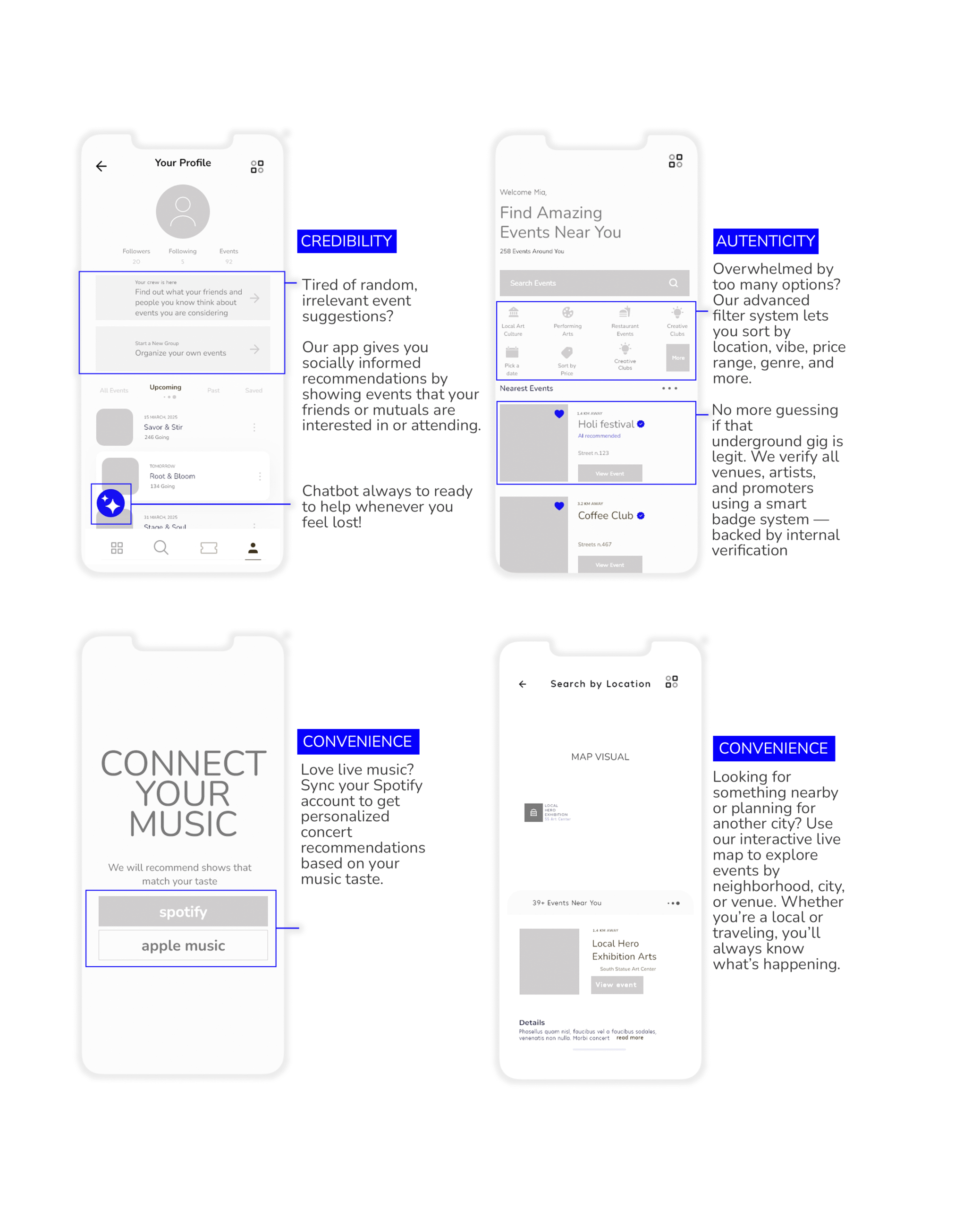
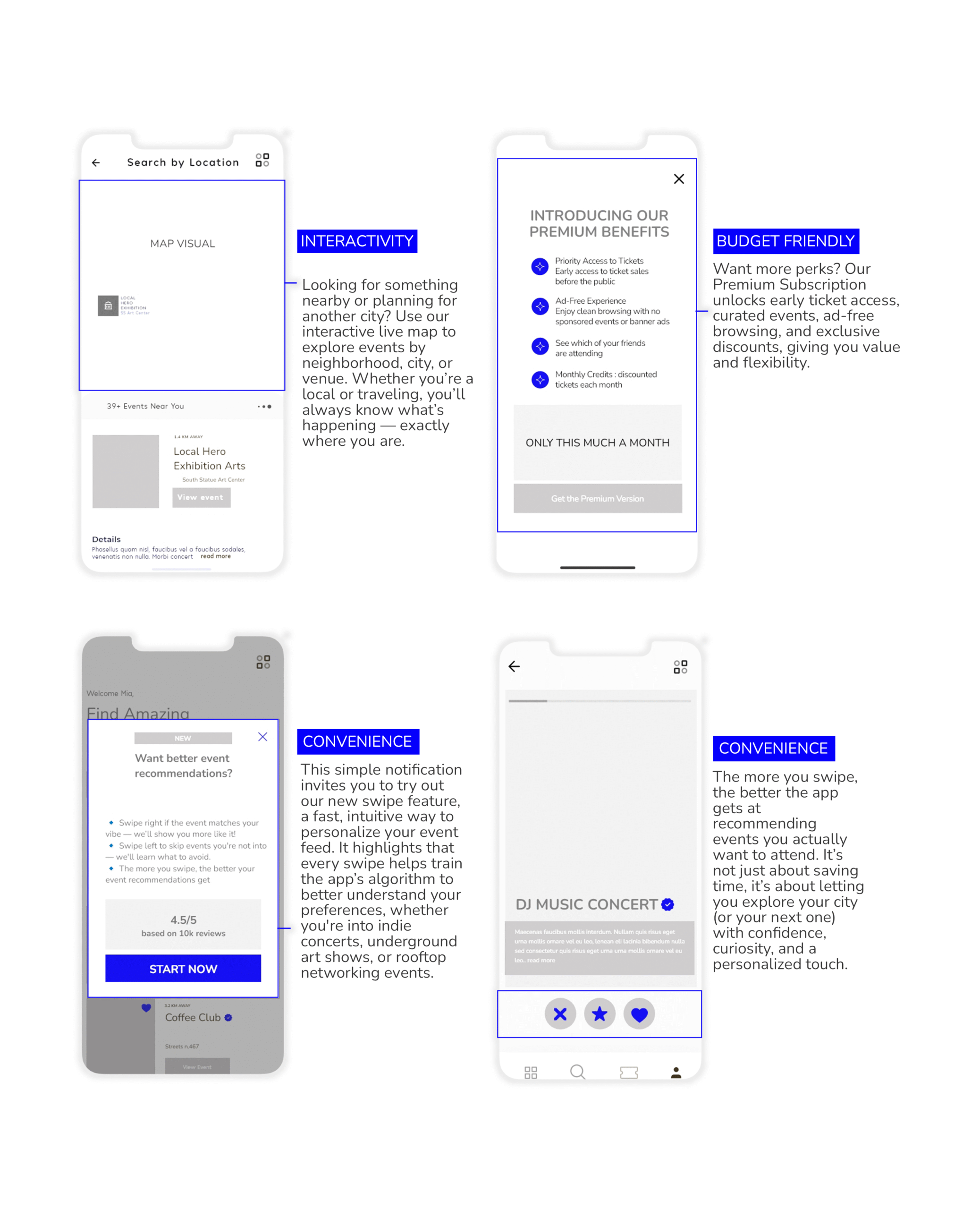
Designing Solutions
Brainstorm and ideate potential solutions.
Understanding our users is the foundation of a user-centered experience. This persona, Leila, represents a typical user of our platform—a young, creative student in Beirut who actively seeks out cultural experiences but faces challenges navigating the current event discovery landscape. By diving into her background, goals, and frustrations, we gain insight into how to design a solution that truly fits her lifestyle.
Color Palettes
Primary and Secondary Colors
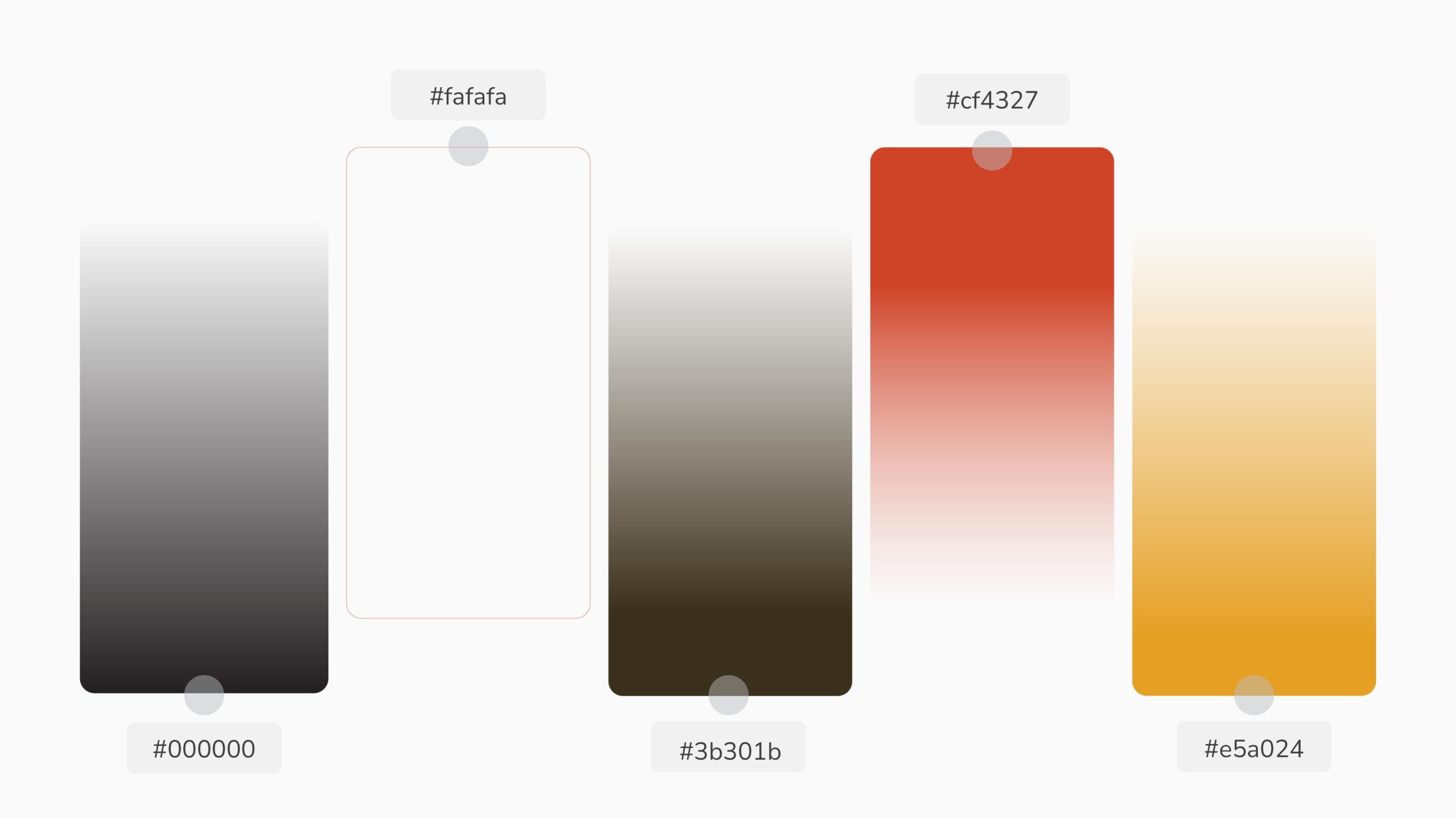
Typography
Primary and Secondary Fonts
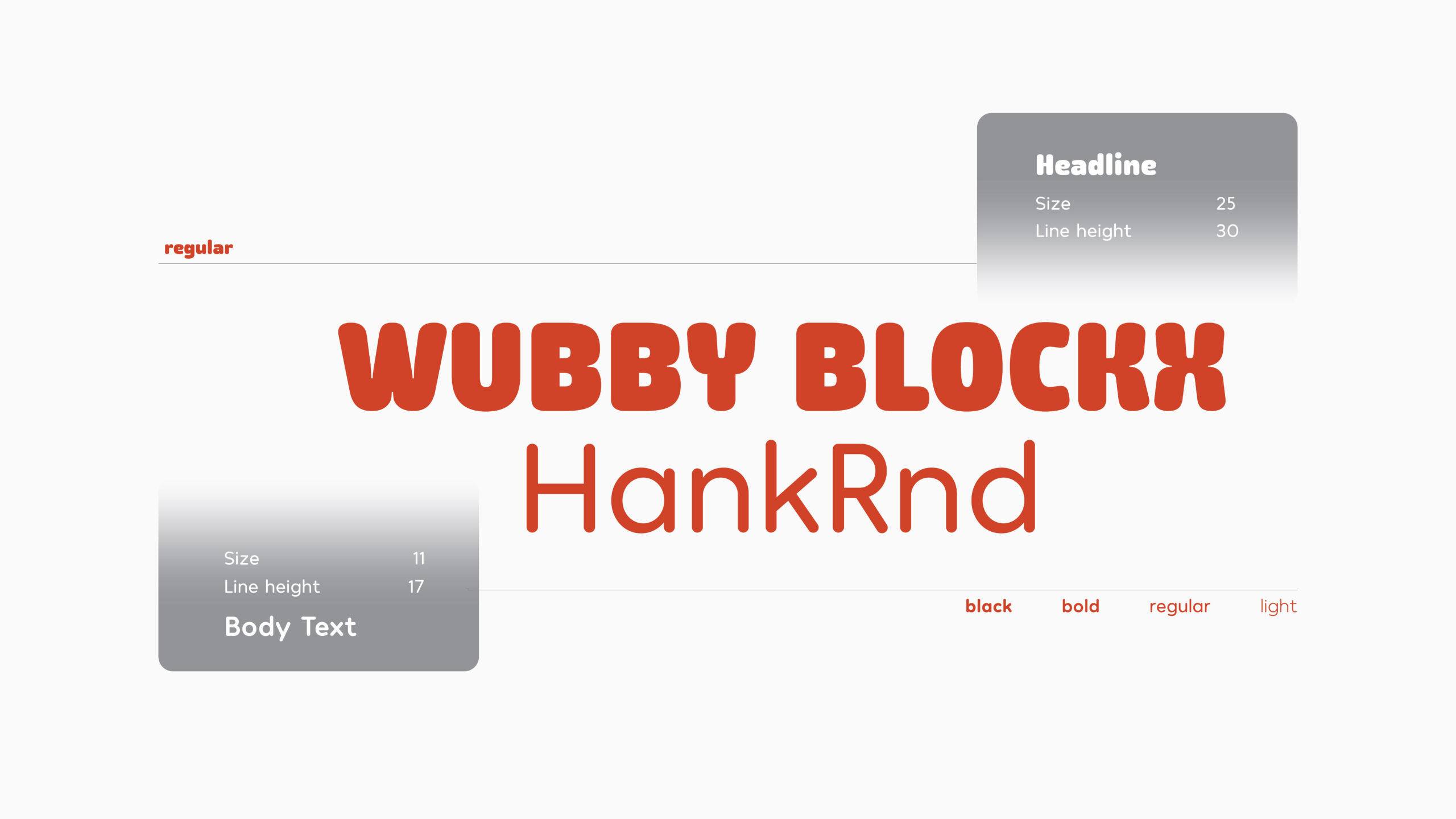
UI Design and Results
